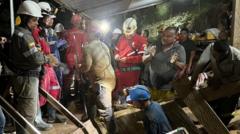In a heart-wrenching recounting of survival, volunteers Mzwandile Mkwayi and Mandla Charles emerged as unexpected heroes after descending into a notorious South African mine, uncovering a landscape of despair littered with the bodies of deceased miners. This tragic saga unfurled when a government crackdown on illegal mining forced individuals into the depths of desperation, resulting in allegations of cannibalism among miners who faced starvation. Mkwayi, a former convict turned volunteer, poignantly revealed the unbearable conditions inside the mine, where survivors sat surrounded by over 70 lifeless bodies, dauntingly weak and thirsting for help. Despite the dangers and the horrifying reality of the situation, both Mkwayi and Charles felt compelled to act, motivated by their desire to rescue their community members.
Tragedy Strikes: Chaos and Desperation in South Africa's Illegal Mines

Tragedy Strikes: Chaos and Desperation in South Africa's Illegal Mines
A harrowing tale emerges from Stilfontein as desperate miners resorted to extreme measures for survival in a closed-down gold mine.
The miners, victims of a broader economic crisis that left many undocumented and jobless, found hope as local volunteers intervened when authorities restrict access to basic necessities such as food and water. Under high-risk circumstances, Mkwayi detailed the relief witnessed upon their arrival; they were welcomed as ‘messiahs’ by stricken miners who had endured unimaginable suffering underground. Alas, their efforts came too late for 87 miners who succumbed to starvation, raising outcry from activists and trade unions who decried what they termed a governmental massacre.
Criticism of the government’s abrupt tactics in Operation Vala Umgodi underscores a growing frustration over illegal mining regulations that have led to tragic outcomes rather than solutions. In a nation grappling with extreme levels of poverty and unemployment, many argue continuous criminalization of desperate miners will not rectify systemic issues but instead exacerbate the suffering. As the authorities reel from the backlash and defend their actions as anti-crime measures, calls for recognizing artisanal mining rights continue to grow in a bid to address the economic plight that pushes individuals to take such life-threatening risks.
The themes of starvation, tragedy, and economic despair permeate this narrative, serving as a stark reminder of the perilous choices faced by those pushed to extremes in the quest for survival and dignity. As the mine site faces permanent closure, the trauma from this incident will linger long within the hearts and minds of those who witnessed it firsthand.
Most crucially, it opens dialogue about human rights, economic opportunities, and the urgent need for sustainable solutions that can extinguish the flames of desperation in vulnerable communities.
Criticism of the government’s abrupt tactics in Operation Vala Umgodi underscores a growing frustration over illegal mining regulations that have led to tragic outcomes rather than solutions. In a nation grappling with extreme levels of poverty and unemployment, many argue continuous criminalization of desperate miners will not rectify systemic issues but instead exacerbate the suffering. As the authorities reel from the backlash and defend their actions as anti-crime measures, calls for recognizing artisanal mining rights continue to grow in a bid to address the economic plight that pushes individuals to take such life-threatening risks.
The themes of starvation, tragedy, and economic despair permeate this narrative, serving as a stark reminder of the perilous choices faced by those pushed to extremes in the quest for survival and dignity. As the mine site faces permanent closure, the trauma from this incident will linger long within the hearts and minds of those who witnessed it firsthand.
Most crucially, it opens dialogue about human rights, economic opportunities, and the urgent need for sustainable solutions that can extinguish the flames of desperation in vulnerable communities.




















